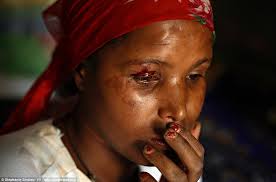
A few days ago, Nigerians took to various social media platforms to discuss the constitutionalizing of child marriage. Predominantly in parts of Nigeria, young girls are married off by their parents to mostly older men who have paid an amount in cash or in kind to their parents as bride price. Under the guise of tradition and custom, female kids as young as 9 years are coerced into marrying older men some of whom are as old as 70, usually as fourth or fifth wives, these girls end up as glorified sex slaves in the houses of their “husbands”. These Nigerians are responding to the moves made by the Nigerian Senate to constitutionalize these marriages and grant recognition to them. During the ongoing constitutional review, the Senate by not taking out section 29, subsection 4b essentially stamped the marriage of minors.
Here is section 29 of the Nigerian constitution;
29. (1) Any citizen of Nigeria of full age who wishes to renounce his Nigerian citizenship shall make a declaration in the prescribed manner for the renunciation.
(2) The President shall cause the declaration made under subsection (1) of this section to be registered and upon such registration, the person who made the declaration shall cease to be a citizen of Nigeria.
(3) The President may withhold the registration of any declaration made under subsection (1) of this section if- (a) the declaration is made during any war in which Nigeria is physically involved; or (b) in his opinion, it is otherwise contrary to public policy.
(4) For the purposes of subsection (1) of this section.
(a) "full age" means the age of eighteen years and above;
(b) any woman who is married shall be deemed to be of full age.
According to Mohammed Aliyu Mashi who heads the General Improvements of Persons Initiative (GIOPINI) a nonprofit based in Kano, more than half the population of girls in Northern Nigeria are married off before the age of 15.
Many Nigerians, mostly the youth have taken to social media platforms to voice their opinions about the negative implications of this section of the constitution. A quick look at their views reflects the desire to save Nigerian female children from arbitrary coercion by their parents or guardians into forced marriages. They consider this bill to be both an enemy of individual liberty and modernity. Child marriage is a violation of human rights and as writer Chiechefulam Ikebuiro puts it, “it is a barrier to social development as well as individual development. People should be allowed to marry when they are ready for marriage. Ready emotionally, mentally and most importantly physically”.
Girls married off at early are exposed to domestic violence. Polygyny being very predominant in Nigeria where the highest rates of forced child marriages occur, these hapless kids find themselves as fifth or sixth wives in families where feuds and bitter rivalry occur between the wives. These kids have their childhoods taken from them and are forced into a life of glorified slavery in the name of marriage. They become tools to quench the insatiable sexual appetites of peadophiles. This unfortunately in some way can be attributed to the patriarchal nature of our culture.
One would wonder what happens to their education when they get married. The answer is sad, in most cases, it stops! The UNFPA states that “virtually no married girls are in school; only 2 percent of 15 – 19 year-olds are in school, compared to 69 percent of unmarried girls”. The fact that men who pay the bride prices and marry these kids are several years older than them, this may limit married girls’ autonomy and the ability to take decisions, the UNFPA again states that in Nigeria, the mean age difference between spouses in these forced child marriages is 12 years if the wife marries before 15 compared to 8.5 years if the wife marries at or after the age of 20. There are also medical risks as many of these girls are not physiologically capable of pregnancy without having some form of complication or the other, little wonder Nigeria has a high case of obstetric fistula.
Girls who try to flee from these forced marriages face other problems, as Hafsat Baba, director of a nonprofit that focuses on child marriages in Northern Nigeria states “In many instances, girls who are unable to cope with their husbands run away and end up as prostitutes. A number of prostitutes will tell you that they were victims of early marriage and ran away because they couldn’t live with the husbands forced on them (by their parents)”.
Laws are meant to protect the freedom of the individual from aggression and coercion while upholding the rights and dignity of every human being and should not be a means to legalizing the coercion of kids into marriage.
Olumayowa Okediran, International Executive Board, Students For Liberty
@ookediran


